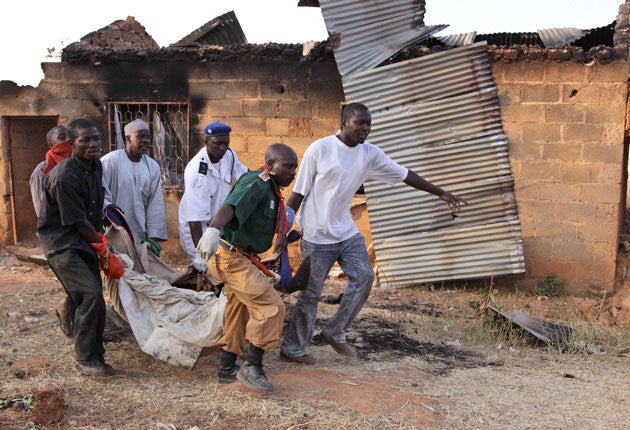Bodies pulled from wells after mob rampage in Nigeria
Hundreds feared dead after Christian gangs armed with guns and machetes target Muslim villagers

Mosque and government officials have pulled more bodies from wells and sewage pits in a village near the Nigerian city of Jos, victims of what the US-based Human Rights Watch said appeared to have been a targeted massacre.
Four days of clashes between Christian and Muslim mobs, armed with guns, knives and machetes, resulted in the deaths of hundreds of people in Jos and surrounding communities last week before Vice President Goodluck Jonathan deployed the military to contain the violence.
Muhammad Tanko Shittu, a senior mosque official organising mass burials in Jos, said that more than 200 bodies had been found in Kuru Jantar, a village also known as Kuru Karama or Kuru Gada Biu. "So many bodies were dumped into wells and were littered around, others were being evacuated by the federal authorities," he said. Some estimates have put the death toll at more than 400, although official figures have been much lower.
Nearly all the mud-walled homes in the one-time mining town suffered fire damage or had been destroyed. The central mosque, where residents say young and old sought refuge during an attack on Tuesday, was burned. Human Rights Watch said groups of armed men attacked the mostly Muslim population of Kuru Jantar on Tuesday, burning some alive and killing others as they tried to flee. It urged Mr Jonathan to order an investigation of "credible reports of a massacre of at least 150 Muslim residents".
"They were armed with cutlasses, guns, sticks and bags of stone. It was not the Christians from our community but those from outside who came," one 32-year-old resident of Kuru Jantar, who was not named, told Human Rights Watch. "The children were running helter-skelter. The men were trying to protect the women. People who ran into the bush were killed. Some were burned in the mosque and some went to the houses and were burned," he said.
He said he had seen the bodies of up to 30 children, some burned, some hacked with machetes, and that his wife was in hospital with an 11-month-old girl who had been attacked with an axe. "I came back on Wednesday evening, escorted by the military. I saw dead bodies everywhere. The corpses were there, but now you can just see the blood on the ground. None of the houses are standing," he said.
The unrest around the capital of Plateau state, which lies at the crossroads of Nigeria's Muslim north and predominantly Christian south, underscores the fragility of Africa's most populous nation as it approaches the campaign period for 2011 elections with uncertainty over who is in charge.
President Umaru Yar'Adua has been receiving medical treatment in Saudi Arabia for two months and has not formally handed executive powers to Mr Jonathan, triggering court challenges over the legality of government decisions. Mr Jonathan on Thursday ordered the army to take over security in Jos to prevent further clashes, and pledged those responsible for the violence would face justice.
The authorities relaxed a 24-hour curfew in Jos on Thursday to allow thousands of residents to return to their homes. The strong presence of troops and police has helped restore calm. The Red Cross has estimated 17,000 people were displaced and took shelter in colleges, hospitals and schools. A Red Cross official in neighbouring Bauchi state said yesterday that around 7,000 people were still sheltering in schools there and were being given food and medical supplies.
Join our commenting forum
Join thought-provoking conversations, follow other Independent readers and see their replies
Comments